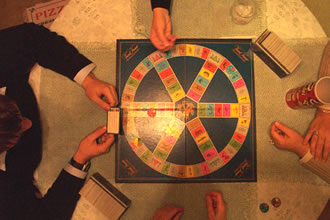 | |
| { Cultural Iconography and Pies: How Trivial Pursuit Dumbed Down } Dave Griffith photo by Dawn C. Bisi It was not, as we say, "an instant hit". There was, in fact, a moment when the Canadian brothers who invented the game realized that, mathematically, there was no way in hell they could break even. This is when they turned to their friends and asked them to buy stock in their nerdy venture. Even with their friend's annoying Canadian money behind it, the brothers were hosed. But like all great Canadian business success stories, it wasn't until a big American company—Parker Brothers who was later acquired by Hasbro, Inc.—bought their product that the real bacon came in. Question: What former New York Mayor's last name appears in the spell check of Microsoft Word? How does one exercise the intellect? The New York Times crossword puzzle? The word jumble next to Marmaduke in the Post-Gazette? Inviting the Mormon missionaries in for tea? Question: True or False, "Blowjobs" is recognized by Microsoft Word's spellchecker? Can it be that the game is getting easier because the world is less confusing to us, less baffling, less complex and awe-inspiring? Can we, as a civilization, after so many years of sleepless nights and ridiculously large microwave ovens and DOS 6.0 and Larry Birds and Michael Jordans and magna cum laudes in business administration and gym memberships shout into the big black night, "Veni, vidi, vici"? The World Trade Center Twelve Tokyo West Berlin It could be a poem in a journal of post-modern literature. It could be a writing prompt given to an intro to creative writing class. But as you might have guessed, these are the answers, verbatim, from four cards appearing in the Genus edition, and they form, in a gestalt way, a picture of a world. Question: What now scandalized power broker who bilked shareholders out of millions appears in the Microsoft Word spell check when you type the name "Elron"? When I was a kid, about eleven or twelve, I didn't know any of the answers but I would admonish the adults around the table for their poor etiquette: not putting the cards back in the box the correct way, calling the pies "cheeses". It made me so upset. Marylin Monroe? Auschwitz? Jesse Owens? Pontius Pilate (a name I didn't know that I knew until it was asked in the form of a question)? How did they know this stuff? Sitting around the oak table in my grandmother's house playing while the beer cans accumulated and the snow piled up and the car engines warmed to take us to midnight Mass, I can remember feeling a sense of awe at the knowledge the adults displayed. I remember feeling so useless unless I was the one asking the questions. | |
 NEW YORK—(BUSINESS WIRE)—Sept. 24, 2002—Today, former New York City Mayor Rudy Giuliani took center stage to lead the celebration of the TRIVIAL PURSUIT game's 20th anniversary at Toys "R" Us Times Square. The festivities included soccer champion, Mia Hamm and former dot.com icon, The Sock Puppet, as mystery guests, who with Mr. Giuliani, broke into comedic banter onstage at the international flagship store for Toys "R" Us. The event closed with the Village People's performance of "YMCA," which brought the crowd to their feet. These notables and thousands of others from the past 20 years are part of Hasbro, Inc.'s new TRIVIAL PURSUIT 20th ANNIVERSARY EDITION game.
NEW YORK—(BUSINESS WIRE)—Sept. 24, 2002—Today, former New York City Mayor Rudy Giuliani took center stage to lead the celebration of the TRIVIAL PURSUIT game's 20th anniversary at Toys "R" Us Times Square. The festivities included soccer champion, Mia Hamm and former dot.com icon, The Sock Puppet, as mystery guests, who with Mr. Giuliani, broke into comedic banter onstage at the international flagship store for Toys "R" Us. The event closed with the Village People's performance of "YMCA," which brought the crowd to their feet. These notables and thousands of others from the past 20 years are part of Hasbro, Inc.'s new TRIVIAL PURSUIT 20th ANNIVERSARY EDITION game.